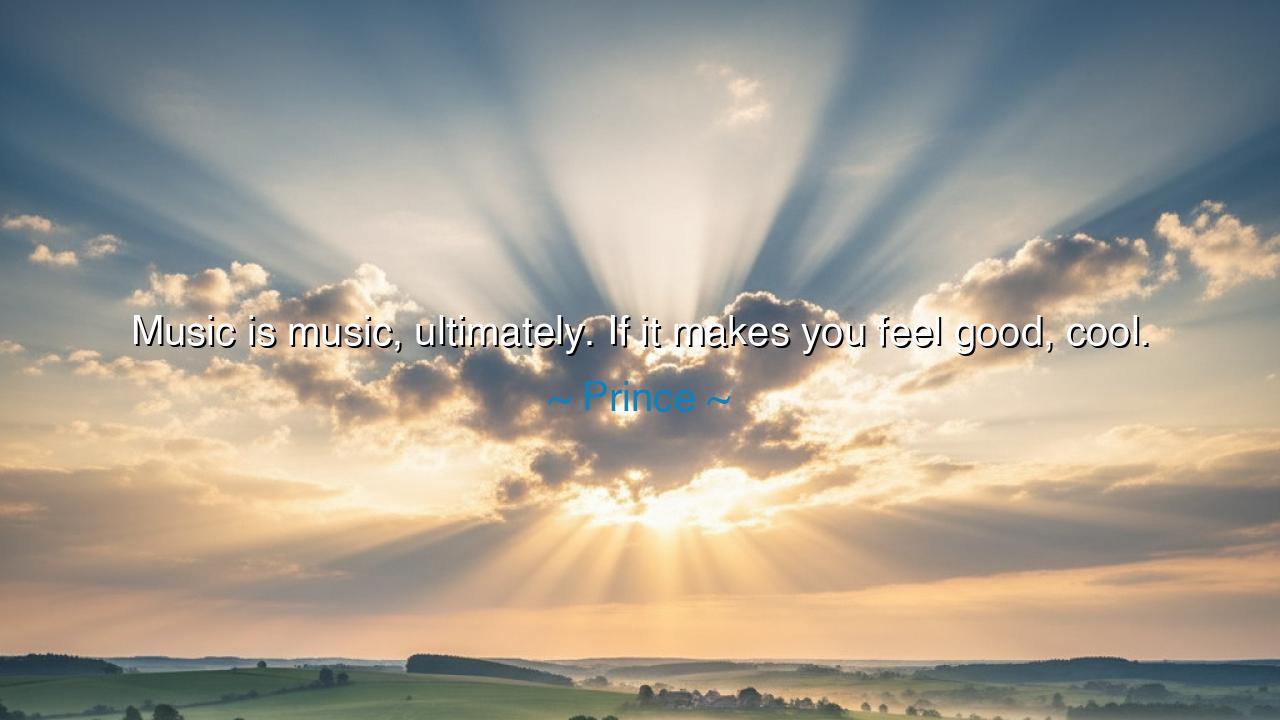
Music is music, ultimately. If it makes you feel good, cool.






When the artist known as Prince declared, “Music is music, ultimately. If it makes you feel good, cool,” he spoke not as a performer but as a prophet of the universal language. His words carry a radiant simplicity, yet behind them lies a philosophy as old as time itself: that art is not bound by category, nor truth by style. For Prince, music was not divided by race, genre, or generation—it was one river with many currents, all flowing toward the same ocean of feeling. He saw that the power of song lies not in its form, but in its effect upon the soul.
In the temples of ancient Greece, the philosopher Pythagoras once said that music was the harmony of the cosmos itself—the movement of the stars translated into sound. To him, the tones of the lyre were reflections of divine order. Prince, centuries later, spoke with the same sacred insight, though with the voice of a modern bard. In his world of funk, rock, soul, and pop, he broke every boundary that men had built. He refused to let his art be caged by labels. “Music is music,” he said—and in those words, he shattered the walls of genre just as Pythagoras had dissolved the walls between heaven and earth.
Think of Prince upon the stage: a slender figure in violet light, guitar in hand, moving as though the spirit itself were dancing through him. He could make the crowd weep, shout, and transcend their own skin—all in one song. He knew that feeling was the purest form of understanding. What mattered was not whether a chord was called jazz or rock, but whether it moved the heart. His vision was one of freedom—freedom not only for the artist but for the listener, to love without limits, to feel without shame.
History gives us another soul who understood this truth: Ludwig van Beethoven. Deaf, tormented, and misunderstood, he too believed that music was the speech of emotion itself. When others sought rules, he sought revelation. His Symphony No. 9, which echoes through the centuries with the cry of “Joy!”, was written when he could no longer hear his own creations. But he felt them—and that was enough. Like Prince, Beethoven proved that music transcends boundaries. It is not made of sound alone, but of something eternal, something that reaches beyond the senses.
Prince’s words remind us that all divisions—between genres, between peoples, between hearts—are illusions. Music dissolves them. When it makes us feel good, it connects us to something greater than ourselves. It tells us, “You are alive. You belong.” In this way, it is both the healer and the bridge. It carries across language, faith, and time, whispering one truth: that joy is sacred.
And so, my friends, the lesson is this: do not imprison beauty with definitions. Let music be what it is meant to be—wild, freeing, alive. Whether it rises from a cathedral’s choir or from a street performer’s humble strings, if it makes you feel good, honor it. For the ancients would tell us that feeling is the voice of the divine within us, and when it stirs, we are hearing something beyond the mortal.
In your life, live by the rhythm of this wisdom. Listen deeply—to music, yes, but also to the melody of your days. If something makes your soul hum, if it fills you with light, then it is good. Do not question its worth by the measure of others. Follow what makes you feel alive, and you will walk the path of the true artist—the one who creates not for approval, but for truth.
For as Prince himself embodied, music is life, and life is music. The forms change—the instruments, the ages, the tongues—but the song remains. It plays within every heart that dares to feel. So let it move you. Let it teach you. And when it does—when it makes you feel good—then smile, and know that you have touched something eternal. Cool.






AAdministratorAdministrator
Welcome, honored guests. Please leave a comment, we will respond soon